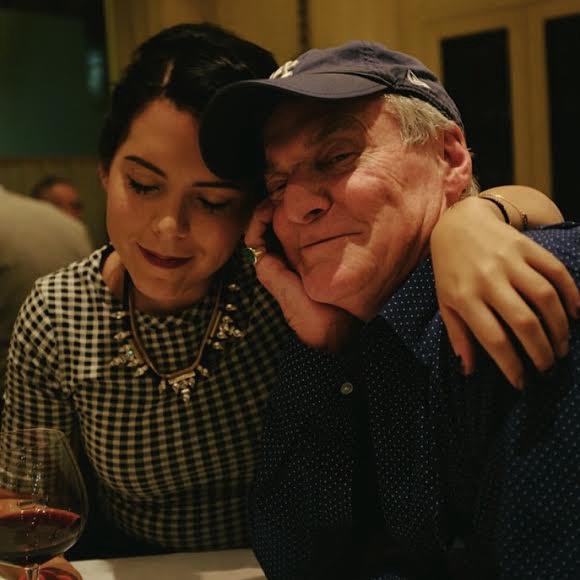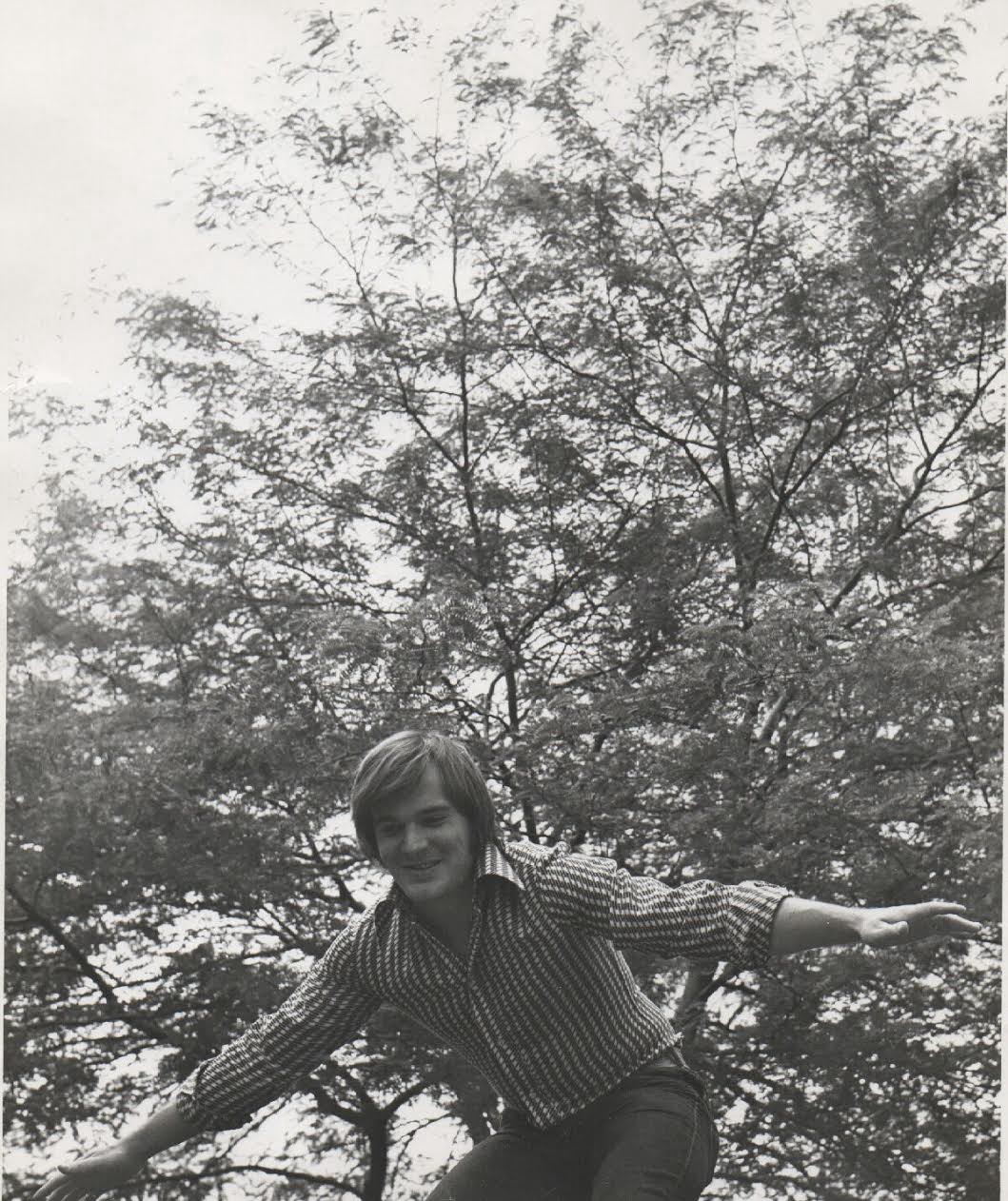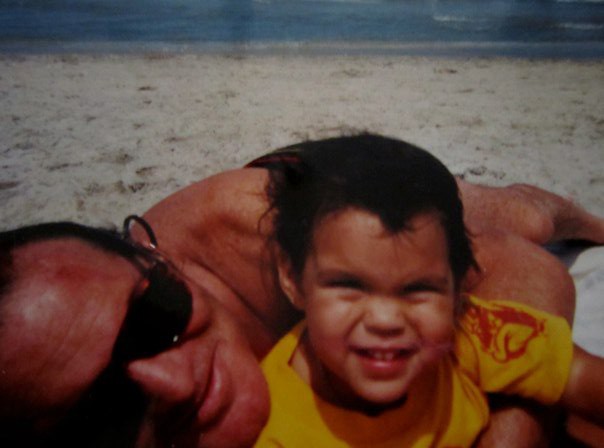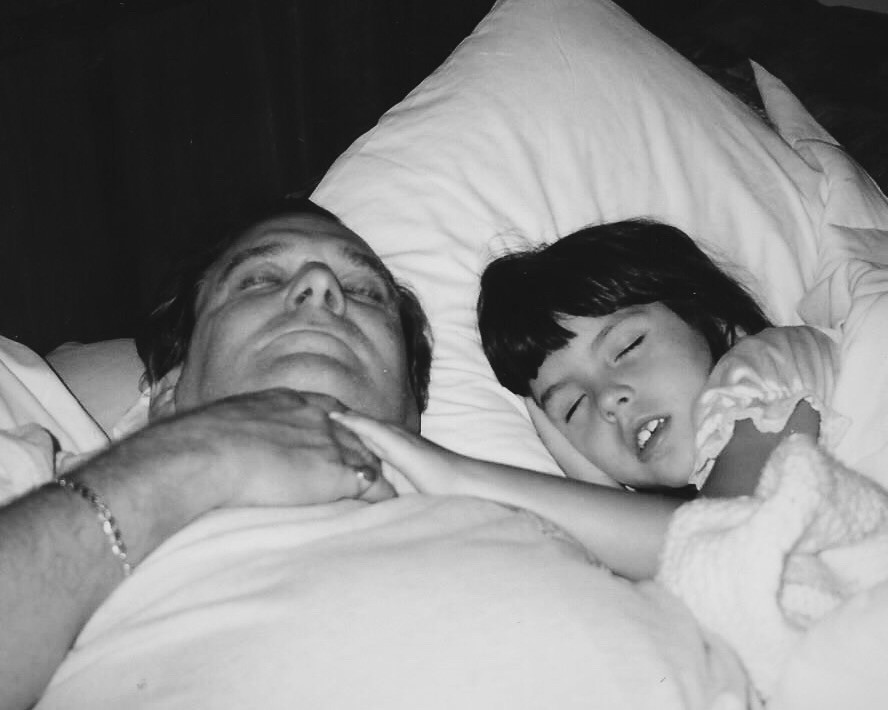Here’s a secret: I wear my father’s clothes every day. Not entire outfits, but a garment or two, always. I wear his striped t-shirts to bed at night, his vibrant dress socks under my boots. I’ve tailored his button-up shirts to fit me in the shoulders; I’ve removed a link or two from his bracelets. Yes, I am ashamed to admit, I have even worn his underwear. But that was only once, and, well, I happen to wear Calvin Klein briefs, too. I wear his jade pinky ring on my ring finger, and his army tag necklace never comes off my neck.
I thumb the words: MADDEN, JOHN L, #11500138, JEWISH.
Why the hell does it say Jewish? I asked my mother when she gave me this tag.
Because they had to know how to honor the dead, she replied, in case he died.
My father has been dead for one year five months and 12 days, as I write this. It was his lungs, not the army. I don’t have to check the calendar, or count, because my body knows. Each day, I think, I am not doing grief right. I am wading too slowly through this, or, at moments, too quickly, or not at all. My grief is selfish, my grief is smaller than other griefs, it is unjustified, my time for sadness is up; everybody dies, so it’s absurd to feel this bad, that my situation is unlike all others. Spoiler alert: That is grief talking, and none of this is true.
Every single day since November 2, 2015, I have asked myself that same question: How do I best honor the dead?
Because that army tag was incorrect. My father didn’t want a religious ceremony. That is not the kind of honor he wanted.
But who could know that?

So, for my fellow fatherless girls, to widowers, mothers, sisters, grievers — if you have lost your person — this is the best that I could do. This is how I’ve honored my dead, and how I’ve honored my grief, the best I can manage. My list won’t be like yours, but here it is:
1. Wear their clothes, jewelry, socks, anything.Their photo in a locket at your chest ‘til it warms. A patch of fabric from their blanket. A hat. Something about wearing them so close to your beating, breathing body can feel like preservation.
2. Listen to their favorite songs as loud as you can manage.Play them over and over again if it pleases you. Start a song over if you zoned out for a single word, if you didn’t appreciate the chorus enough. Do this until your person is sitting right next to you, singing along; do this until you can hear nothing else.
3. Throw fits. Rage is the easiest emotion to access outside of your grief.People will compare your loss to their break-ups, or that dead sort-of-friend from middle school, and it is absolutely acceptable to hate them for it. Pull fistfuls of grass out of the ground if you want to. Storm out of a restaurant crying because My father would have loved this one dish on that menu, hereally would have. How unfair that he didn’t get to eat it. And how fucking unfair thathe never got to see “The Revenant” or “Fences” with you, how he never got to hate “La La Land.” Throw your popcorn. Then pick it up and eat what’s left in the bag.
4. Have sex.For a long time, I felt like giving into pleasure, or joy, or the acts of living was a betrayal. It’s not.
5. Honor their traditions.On my father’s 70th birthday, I went to the movie theater at which I met him every Sunday for eight years. It was my first time returning to that specific theater, and it was hard. Still, I found our seats. I watched a movie. I ate a shit ton of pizza afterwards. I knew he would have loved to spend his birthday this way. I knew that years later, it would get easier to celebrate it for him.
6. Share their brain.I watched my grandmother wrestle her way through Alzheimer’s before losing my father. I realized, then, that the greatest tragedy of losing someone is often the fact that the great big beautiful storage box of information they have been collecting for their entire lives will be lost with their bodies. Preserve what they knew.
Write down their strange facts, their stories, their anecdotes that once bored you to death and even the way they mispronounced every Jewish prayer on the holidays and save them, share them with others, bring them back into the room by means of their vast and unique knowledge.

7. Say goodbye (for now) to people who don’t try to understand your grief.Keyword:Try, because no one who has not gone through this will actually understand. Listen, no one. Do your best to communicate exactly what you need. I need you to check in more, or, I am depressed, I need some company. You may feel burdensome doing this, but everyone will have their turn to be a burden, and if anyone makes you feel like one, say goodbye. If you’re lucky, a handful will come forward and bake you bread, play with your hair, walk your dogs, buy you dish soap when you’ve forgotten, and you will remember this list of people for the rest of your life.
8. Believe.Let yourself believe whatever you want, even if your rational brain says Nope, not possible or, Nope, that’s not you. Believe in ghosts, believe in the afterlife, believe your beloved person is communicating telepathically, or through psychics, or trees, or through your dreams. Believe in God, or in nature, or in art, or in a stuffed animal or statue your beloved once loved; become more devout, or ease up on your traditional beliefs.
Allow yourself this freedom, this gift, to keep in touch with the dead however and wherever and through whomever you want.
9. Accept that grief is messy.Accept that grief is not linear, or neat; there is no timeline.
Accept the sneak attacks in the grocery store one year later, or while doing something completely unrelated to them. When I sold my first book this year, I expected a miraculous moment of relief and connection to my father: He would have been so proud of me! Instead, I sat crying in a U-Haul for hours, refusing to tell anyone since I couldn’t tell him: He will never be proud of me again! Grief is brutal in the bad and desperate times, but also, sometimes, in the good ones.

10. You never have to move on.Perhaps you are wondering why I’m writing this now, so far after the fact, one year five months and 12 days later; one month before what would have been my father’s 71st birthday. Because grief doesn’t stop. Like energy, it only changes shape, moves, swells. Because it is OK to wake up some days without thinking of them, and it is also OK to call in sick to work because they showed up in your dreams, breathing. Because missing someone, feeling the scorch of that missing in your body every day of your life, is also, in the truest of ways, loving them.
You can trust me on that.



